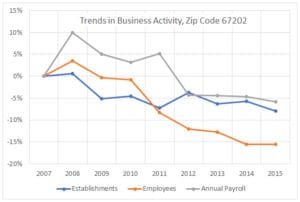A Wall Street Journal article reports on Wichita, but there are a few issues with quotes from the mayor.
In an article in one of the nation’s leading newspapers, Wichita Mayor Jeff Longwell is quoted:
“We’re no longer going to play in this traditional incentive game and offering cash to companies,” said Mayor Jeff Longwell. “We think quality of life will do more.”

What is wrong with what the mayor said? It’s mostly true that the city is no longer paying cash as jobs incentives, although that was never a large part of the city’s spending on incentives. What’s troubling about the mayor’s remarks is that the city has many incentives programs that are just as valuable as paying cash. The State of Kansas adds others. Here are the major programs the city and state offer that are as good as cash:
The city offers programs (IRB and EDX) in which companies escape paying property taxes, which is just as good as receiving the same amount in cash. 1
The IRB program, once bonds are authorized by the city, often allows a company to escape paying sales taxes, in some cases several million dollars. Not paying a dollar in sales tax is just as good as receiving a dollar in cash. 2
The city uses tax increment financing (TIF), in which property taxes paid by a property owner are redirected for the property owner’s benefit. So instead of paying cash for improvements, developers let their property taxes pay for these. 3
The city uses STAR bonds, in which future sales tax revenue is redirected for the benefit of a specific property owner. This lets the property owners avoid spending cash on things. 4
The city approves the formation of community improvement districts in which the taxing authority of the city is used to allow merchants to collect extra sales tax. 5
For one company, the city cut permitting fees in half. It’s estimated the company will save $85,000. That’s as good as receiving cash. 6
And if this is not enough, the city might pay your company $6,500,000 in cash to use your parking garage during the hours you don’t need it. (Never mind this parking isn’t really needed.) 2
Besides these programs, the state has programs such as PEAK, which pay cash benefits to companies. Also, the city supports applications for state and federal historic preservation tax credits. Receiving tax credits is as good as receiving cash.
Set aside the question of whether these incentive programs are necessary and effective. Then we’re left with a few questions:
Is the mayor not aware that these incentive programs are as valuable to companies as receiving cash payments?
Or does the mayor believe that the methods by which these programs are implemented obscure the economic realities?
Or is there some other reason?

But if the mayor thinks we’re doing something other than using the equivalent of cash to lure companies to Wichita — or just to retain existing companies — he is wrong.

It’s true that a lot of money, but public and private, has been spent on downtown. The economic results, unfortunately, are not good: Since the time of increased investment, there are fewer business establishments, fewer people working downtown, and lower earnings generated in downtown Wichita. 9
—
Notes
- Weeks, Bob. Industrial revenue bonds in Kansas. Available at https://wichitaliberty.org/kansas-government/industrial-revenue-bonds-kansas/. ↩
- Ibid. ↩
- Weeks, Bob. Wichita TIF projects: some background. Available at https://wichitaliberty.org/wichita-government/wichita-tif-projects-background/. ↩
- Weeks, Bob. STAR bonds in Kansas. Available at https://wichitaliberty.org/kansas-government/star-bonds-kansas/. ↩
- Weeks, Bob. Community improvement districts in Kansas. Available at https://wichitaliberty.org/kansas-government/community-improvement-districts-kansas/. ↩
- Weeks, Bob. More Cargill incentives from Wichita detailed. Available at https://wichitaliberty.org/wichita-government/cargill-incentives-from-wichita-detailed/. ↩
- Ibid. ↩
- Weeks, Bob. Wichita MSA employment series. Available at https://wichitaliberty.org/economics/wichita-msa-employment-series/. ↩
- Weeks, Bob. Downtown Wichita business trends. Available at https://wichitaliberty.org/wichita-government/downtown-wichita-business-trends/. ↩
Leave a Reply